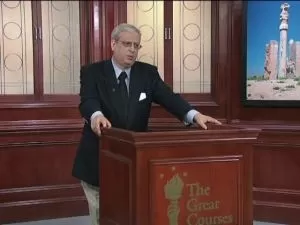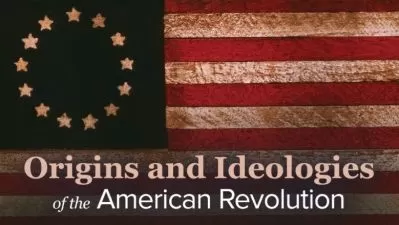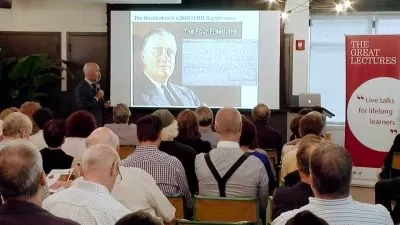Books that Matter: The Federalist Papers
Joseph L. Hoffmann
6:41:43
Description
Despite their lack of official or legal status, it would be difficult to overstate the influence of The Federalist Papers. These 85 brilliant essays have served as the single most important guide to the interpretation and application of the United States Constitution for more than 230 years. Authored by Alexander Hamilton, James Madison, and John Jay, The Federalist Papers offer a detailed blueprint for building a successful democratic republic, investigating such topics as:
- The danger that factions posed in a representative democracy;
- The balance of power between the federal government and the states (“dual sovereignty”);
- The way a bicameral legislature would prevent the rise of tyranny; and
- The roles of the president and the federal judiciary.
Over the past two centuries, the American government has seen its share of trials and tribulations, and the 21st century has ushered in a host of new crises, from the growing surveillance state to the political polarization exacerbated by social media. Will the American system of government survive the next crisis? Are we still governed by the same system the Framers of the Constitution envisioned? What do they have to tell us about good governance today—or our political future?
Delve into these questions and more with Books That Matter: The Federalist Papers. Taught by acclaimed professor and legal scholar Joseph L. Hoffmann of the Indiana University Maurer School of Law, these 12 thought-provoking lectures take you back to the hot summer weather of Philadelphia in 1787, when the delegates from the states gathered to revise the Articles of Confederation.
What emerged from the proceedings was an entirely new Constitution representing an entirely new system of government unlike anything the world had ever seen. As you will learn, the Framers were rightly concerned about whether the 13 largely autonomous states would accept a strong, centralized federal government, and whether such a system could include safeguards to protect against the tyranny they’d just fought a war to overcome.
To answer these concerns, the authors laid out a bold vision for the new nation, drafting what became essentially the Bible of American government—perhaps America’s most significant contribution to the way that human beings choose to organize their lives, and their societies, in order to fulfill their hopes and pursue their dreams together. Books That Matter: The Federalist Papers surveys this magisterial body of work and takes you inside the strengths—and potential weaknesses—of the American government as it was envisioned in its earliest days.
Reflect on the Threat of Tyranny
Among other topics, you’ll consider what an interesting word “federalism” is. Today, we associate the word with states’ rights and the effort to limit the scope of the federal government. But when you go back in time to the Constitutional Convention of 1787, the Federalists were pushing for a strong federal government. Hamilton and Madison, in particular, believed that a loose confederation of 13 nation-states left America vulnerable, and that you needed a centralized governing power.
In The Federalist Papers, they made their case for the new Constitution and explicated their vision for a new American federal government that would be strong, yet not tyrannical. For instance, in Federalist No. 10, Madison argued that a pure democracy would lead to the rise of factions that would have the power and tendency to vote for narrow interests against the public good. A democratic republic, by contrast, would allow for the people to express their will indirectly.
The brilliance and innovation Hamilton, Madison, and Jay laid out depends upon a delicate balance of powers—between the federal and state governments; among the legislative, executive, and judicial branches of the federal government; and even within the legislature itself. It is nothing shy of astonishing how the Framers were able to construct a system so perfectly designed to protect against both the tyranny of the masses and the tyranny of a monarch.
Unpack the System of American Government
If you accept the premise that America needed a centralized federal government, what exactly is the role of this government? Professor Hoffmann takes you through Federalist Nos. 41, 42, 43, and 44, in which Madison described and defended the list of “enumerated powers” of the federal government.
To exercise these enumerated powers, the government needed several branches to operate:
- House of Representatives elected by the people that would be able to express their direct will;
- Senate whose members originally were appointed by the states, offering state governments a lever of power;
- President chosen by an electoral college; and
- Federal judiciary whose members are appointed for life.
Not only does Professor Hoffmann explore the distinct roles of each branch of government, but he also shows how these branches evolved over time. For instance, he explains the story of Marbury v. Madison, arguably the most influential Supreme Court case of all time, in which the Court declared its power to review laws for compliance with the Constitution.
He also examines how the balance of power has shifted over the years, such as the rise of the American presidency as the most powerful political leader in the world; the changing interpretations of the interstate commerce clause; and the way the Supreme Court has become politicized over the years, from President Franklin Roosevelt’s court-packing scheme to the political litmus tests of judicial appointments in the modern era.
Consider the Future of the American Experiment
One of the delights of this course is the opportunity to get inside the minds of the Framers of the U.S. Constitution. You understand their hopes and fears, and you get a window into their tactical brilliance in pitting parts of the government against each other for the good of the citizenry.
But this course truly comes alive because the continued relevance of The Federalist Papers in modern America, where questions of federalism still abound: Who should drive the reform of our educational system? Who should solve the problems of health care? When a natural disaster (or pandemic) strikes, who should come to the rescue? These matters, ripped straight from the headlines, are all about federalism, a word that ultimately refers to the balance of power between the states and the nation as a whole.
When the Framers created the new American federal system of government, they not only set in motion a brilliant plan to preserve and protect individual liberty against governmental oppression, but they also created an unparalleled model that is being studied, adapted, and adopted by people and governments around the world today.
By the end of Books That Matter: The Federalist Papers, you will gain a sense of what Hamilton, Madison, and Jay might make of America today, whether the American experiment has gone astray, and what The Federalist Papers might be able to teach us to solve the problems of today—and tomorrow.
More details
User Reviews
Rating
Joseph L. Hoffmann
Instructor's CoursesJoseph L. Hoffmann is the Harry Pratter Professor of Law at the Indiana University Maurer School of Law, where he has taught since 1986. He received a J.D. (cum laude) from the University of Washington School of Law. After law school, Professor Hoffmann clerked for the Honorable Phyllis A. Kravitch of the U.S. Court of Appeals for the Eleventh Circuit and for then-associate justice William H. Rehnquist of the U.S. Supreme Court.
Professor Hoffmann is a nationally recognized scholar in the fields of criminal law, criminal procedure, habeas corpus, and the death penalty. He was a co-principal investigator for the Capital Jury Project, the largest empirical project ever to study jury decision making in capital cases, and has been a consultant in criminal and death penalty cases before the U.S. Supreme Court.
At Indiana University, Professor Hoffmann has been recognized with the Outstanding Junior Faculty Award, the Leon H. Wallace Teaching Award, the Trustees’ Teaching Award, the Teaching Excellence Recognition Award, and the Gavel Award.
Professor Hoffmann is the co-author of two of the leading casebooks used by law students across the United States: Defining Crimes and Comprehensive Criminal Procedure. In 2007, Professor Hoffmann appeared in the PBS series The Supreme Court.

The Great Courses
View courses The Great Courses- language english
- Training sessions 13
- duration 6:41:43
- English subtitles has
- Release Date 2023/08/19


















